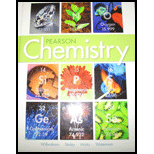
(a)
Interpretation: The chemical equation in terms of interacting particles is to be interpreted.
Concept Introduction: Reactants, products, and an arrow indicating the reaction's direction make up a chemical equation. A balanced chemical equation is one in which the number of atoms in each of the molecules is the same on both sides of the equation.
(a)
Answer to Problem 39A
The interacting particles are three molecules of
Explanation of Solution
The interacting particles are the molecules of reactants and products taking place in a chemical equation.
Consider the given chemical equation as follows:
The three molecules of
(b)
Interpretation: The chemical equation in terms of interacting particles is to be interpreted.
Concept Introduction: Reactants, products, and an arrow indicating the reaction's direction make up a chemical equation. A balanced chemical equation is one in which the number of atoms in each of the molecules is the same on both sides of the equation.
(b)
Answer to Problem 39A
The interacting particles are four molecules of
Explanation of Solution
The interacting particles are the molecules of reactants and products taking place in a chemical equation.
Consider the given chemical equation as follows:
The reaction between four molecules of
(c)
Interpretation: The chemical equation in terms of interacting particles is to be interpreted.
Concept Introduction: Reactants, products, and an arrow indicating the reaction's direction make up a chemical equation. A balanced chemical equation is one in which the number of atoms in each of the molecules is the same on both sides of the equation.
(c)
Answer to Problem 39A
The interacting particles are four atoms of
Explanation of Solution
The interacting particles are the molecules of reactants and products taking place in a chemical equation.
Consider the given chemical equation as follows:
The four atoms of
Want to see more full solutions like this?
Chapter 12 Solutions
Chemistry 2012 Student Edition (hard Cover) Grade 11
 ChemistryChemistryISBN:9781305957404Author:Steven S. Zumdahl, Susan A. Zumdahl, Donald J. DeCostePublisher:Cengage Learning
ChemistryChemistryISBN:9781305957404Author:Steven S. Zumdahl, Susan A. Zumdahl, Donald J. DeCostePublisher:Cengage Learning ChemistryChemistryISBN:9781259911156Author:Raymond Chang Dr., Jason Overby ProfessorPublisher:McGraw-Hill Education
ChemistryChemistryISBN:9781259911156Author:Raymond Chang Dr., Jason Overby ProfessorPublisher:McGraw-Hill Education Principles of Instrumental AnalysisChemistryISBN:9781305577213Author:Douglas A. Skoog, F. James Holler, Stanley R. CrouchPublisher:Cengage Learning
Principles of Instrumental AnalysisChemistryISBN:9781305577213Author:Douglas A. Skoog, F. James Holler, Stanley R. CrouchPublisher:Cengage Learning Organic ChemistryChemistryISBN:9780078021558Author:Janice Gorzynski Smith Dr.Publisher:McGraw-Hill Education
Organic ChemistryChemistryISBN:9780078021558Author:Janice Gorzynski Smith Dr.Publisher:McGraw-Hill Education Chemistry: Principles and ReactionsChemistryISBN:9781305079373Author:William L. Masterton, Cecile N. HurleyPublisher:Cengage Learning
Chemistry: Principles and ReactionsChemistryISBN:9781305079373Author:William L. Masterton, Cecile N. HurleyPublisher:Cengage Learning Elementary Principles of Chemical Processes, Bind...ChemistryISBN:9781118431221Author:Richard M. Felder, Ronald W. Rousseau, Lisa G. BullardPublisher:WILEY
Elementary Principles of Chemical Processes, Bind...ChemistryISBN:9781118431221Author:Richard M. Felder, Ronald W. Rousseau, Lisa G. BullardPublisher:WILEY





